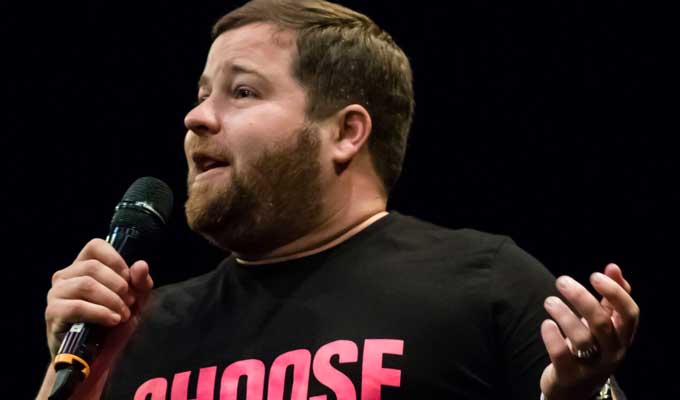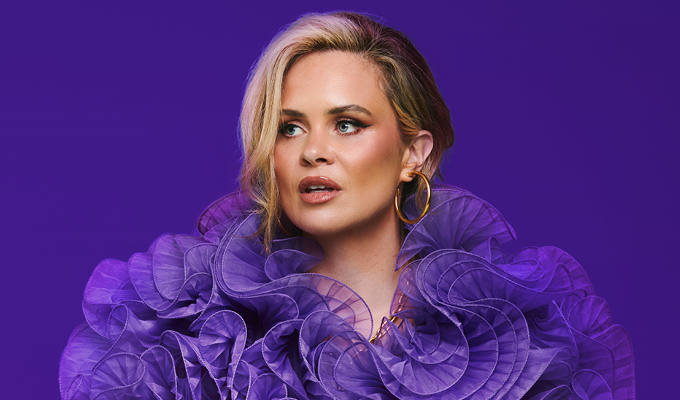
How to make money from comedy
Tiernan Douieb explains how it worked for him
My name is Tiernan Douieb and I’m a comedian, podcaster (isn’t everyone now?), as of recently a father and a very experienced motorway service station connoisseur. It’s highly likely you’ve not heard of me, but while I may not be a household name just yet – not least because no one is sure how to pronounce it, let alone spell it – I manage to earn a reasonable living as a comedian and have been for the last 11 years.
There’s a number of reasons why comedians decide on having our constantly unpredictable, financially unstable and socially inactive life. But mostly it’s down to being driven by an innate, albeit odd, need to get up on stage and make people laugh. Some people are born with that and others, like me, had to find it along the way.
Regardless of your motivations, the challenge is the same: to earn enough money to carry on doing what you love while getting on with your life. I’ve got a five-month-old baby so, for me, it’s supporting my wonderful wife and providing for our family.
Yet, in the world of free online content and panel show cliques, earning money as a stand-up comedian is easier said than done.
Starting Out
When I started gigging back in 2003, I was fresh out of university with all the confidence that comes with being 22. I took every gig offer and entered every comedy competition going, confident of my own talent and skill, despite both at that point being completely unfounded.
I remember my first ever gig in a room above a pub in Greenwich. I was so nervous and spoke so fast that almost no one heard my jokes. After I rushed off, the compere took me to one side and said: 'You’ve got some good jokes, but nobody heard them. You spoke like a machine gun.’
Unfortunately for comedians just starting out, the typical pay for a 20-minute set hasn’t really gone up since the mid-90s, yet the cost of living has increased considerably. The first few years working the comedy circuit I earned no more than £9,000 – that’s barely enough for a sandwich and a pint in London these days, let alone rent.
One thing no one ever told me about being a comic was that it took huge amounts of time and money. There’s the travel, accommodation, admin, taxes, networking and, of course, most importantly, finding time to write your material. Fortunately, I managed to land an advert for Carlsberg at the time which allowed me to hone my skills and paid for the travel to more gigs.
That advert gave me the boost that I needed to get going. So, my first piece of advice to anyone starting out is to take what you can in order to live. I once asked the brilliant political comedian Mark Thomas for advice on a job I wasn’t sure about and he said that you have to do whatever you can that’s within the realms of your skills as a comedian, and that helps you get money and an audience to be able to have the career you want. Once you can live, you can find time to travel, write and do everything else.
My second piece of advice: expense everything. Seriously, I went to the cinema once and had a great idea for a joke about the film I’d been watching. The ticket went straight into my research expenses.
The Big Break
I suppose I am still waiting for my ‘big break’. I have done a very small amount of TV work and would love to do more. Over the years I’ve had several of my scripts optioned though they’ve never made it over the final production hurdle.
That being said, I have had a number of mini-breaks – often from unexpected sources. A few years ago I got a message Out of the Blue on Twitter from one Mr Frankie Boyle. He’d heard me on a podcast and said he enjoyed my set so much, he asked if I’d like to support him on tour. Of course, I jumped at the chance to work with a comedian I respected so much and the tour helped rapidly grow my fan base.
In the last few years I’ve started a podcast called Partly Political Broadcast. I did it mostly just for fun but also to make more timely jokes without them going to waste.
With such a short news cycle and the ongoing sagas of Trump and Brexit, it’s hard to write jokes based on current affairs without them getting old very quickly. The podcast allowed me to riff about all kinds of current topics. It now gets thousands of listeners every week and just this month, while gigging in Hong Kong, I had an audience member tell me how much they loved listening to it!
I think by doing something I enjoyed, the podcast, I got to unleash my creative spirit, which is what good comedy is all about. It’s a creative endeavour that takes you to weird and wonderful places.
So, my third piece of advice would be: do what you enjoy.
Unlike most professions, there is no set pattern for being successful in comedy. Some people will tell you that you need to do the Edinburgh Fringe or that you’ll only find success by entering competitions. But really, if you’re doing what you enjoy, you’ll be at your most creative. People will recognise your creativity and offer to pay you for it.
There are some amazing comedians who got started filming their own clips and putting them on YouTube. It’s a fast and relatively cheap way of gaining fans. For me, it was my podcast, which I started with just a microphone and some editing software. You don’t need to spend thousands putting on a big show at the Fringe anymore – you can get discovered in your pyjamas!
Set aside a bit of money and get yourself a good video and/or microphone setup. If you’ve got talent you’ll get attention. And if there’s one thing comedians love… it’s high fidelity recordings.
Making Money
Even if you get thousands of fans of your YouTube series or podcast, it still doesn’t guarantee you’ll earn much money from comedy. But, waiting around for a call from the BBC won’t enhance your comedy career. So how do you actually earn a living?
For me, the answer lies in doing lots of different things. I co-run Comedy Club 4 Kids where we do stand-up for children aged 6-plus and their families, and alongside that we teach children how to become comedians in our workshops too.
It’s taken me from the most exotic parts of Manchester to the jet-lagged heights of Hong Kong. I also write for other comedians for their tour and TV shows, I’ve recently been writing for adverts too, as well as earning money from my podcast, and participating in radio shows.
Then there are new online streaming services, like NextUp – a video subscription platform specifically for stand-up. I had a couple of my shows filmed and put them on their platform, gaining me new fans who come to my live shows as well as a regular income for views. In fact, they just sold one of my shows to Audible, sending me a chunk of money I wasn’t expecting.
So, my final word of advice is to look at all the options and do a mix of work. That way you don’t end up with all your eggs in one basket but you will gain enough income to live off and gain fans from all walks of life.
None of these projects bring in enough for me to live on their own, but put them all together and I earn a reasonable salary. Perhaps I’ll never rake in the big bucks but, for me, the joy is in doing something I love, working with people I admire and making memories I’ll never forget.
With that in mind I’ll leave you with a few of my favourite memories.
When I was just starting out, my favourite comedian was Ed Byrne. He did a show at my university when I was in my first year and my friends and I laughed so much throughout that we were quoting it for weeks. I was also a big fan of Dave Gorman and wrote to him asking for any advice getting started in comedy. He wrote me a lovely letter back encouraging me to continue writing and trying out material.
Years later, I found myself at a show on stage with both Ed Byrne and Dave Gorman, performing my own material. I don’t think there is any other profession where you get the opportunity to work so closely with your heroes.
Once I did a gig at Outside the Box in Kingston and I’d been asked to go on later so another comedian could get away early. Just as she finished a rush of dark-clothed security guards came flooding into the green room, followed by the one-and-only Robin Williams. He was doing a surprise set just before me! Obviously nervous, I asked him for any advice. He told me a story about a time he ended up performing after one of his heroes, ending the story by telling me how he bombed!
I sat there thinking that there was no way I could follow such a legend of comedy, but by the time he finished the audience was so pumped that they laughed non-stop throughout my set. There’s nothing quite like being able to tell a crowd that Robin Williams was your support act!
• Tiernan Douieb is on Twitter here, and you can watch his NextUp special here.
Published: 21 Sep 2018






